Stressed Out Fish?Learning How Antarctic Fish Will Cope with Climate Change Has Local and Global RamificationsPosted January 7, 2019
Climate change is expected to be stressful on fish species worldwide: as the climate warms, so too will the oceans, putting a strain on creatures that depend on consistent water temperatures. 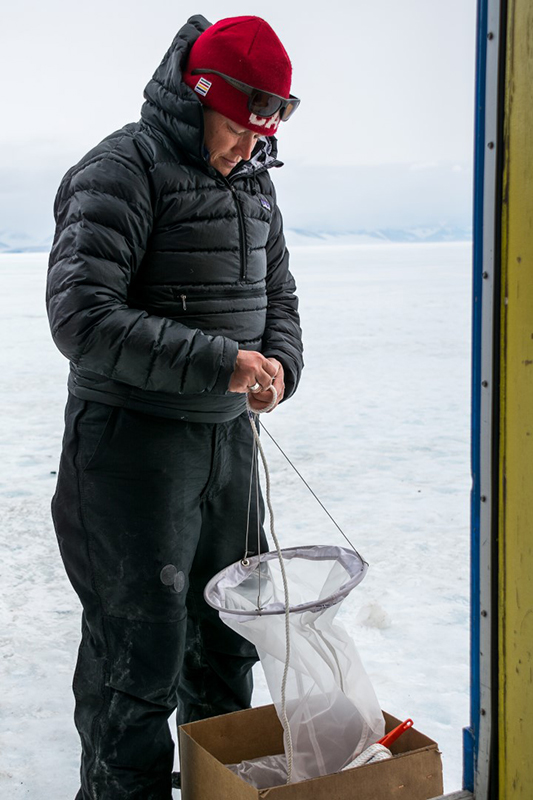
Photo Credit: Mike Lucibella
Anne Todgham prepares a net while out on a fishing expedition at a fish hut near Arrival Heights offshore of McMurdo Station.
A team of researchers recently traveled to Antarctica to investigate what effects warming might have on fish that live in the frigid Southern Ocean, which surrounds Antarctica, where current estimates are that the ocean could warm as much as three degrees over the next century. "We're interested in knowing generally, and in a lot of different fish populations, whether or not the changes that are happening due to climate change are going to affect the ability of fishes to do what they normally do," said Anne Todgham, a professor at the University of California, Davis, and principal investigator on the project. "The Antarctic fish are one piece of a larger piece puzzle of understanding an animal that lives in a very, very stable environment," she added. "If we can get some sort of understanding of unifying things that make animals susceptible to change, then we can project that across [other species]." Antarctic fish also form the base of food chain that includes penguins, seals and whales. So changes to the ecological balance would have wide ramifications, even in Antarctica waters. Todgham's research is supported by the National Science Foundation, which manages the U.S. Antarctic Program. The fish living in the Southern Ocean evolved in waters that are consistently about minus 1.8 degrees Celsius, some of the coldest ocean waters in the world. However, while the waters are frigid, they also are consistent—rarely varying in temperature more than a degree or so—and it's thought that the fish have been able to thrive because of this consistency. 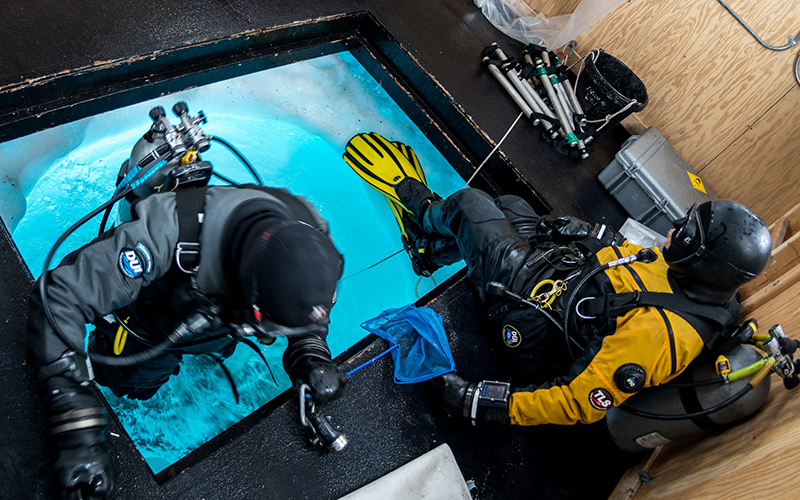
Photo Credit: Mike Lucibella
Equipped with his blue net, diver Tom Horn jumps through a hole in the sea ice to gather fish specimens, while Rob Robbins prepares to follow.
"[This] is one of the most specialized groups of fishes on the planet," Todgham said. "They've evolved under really stable conditions, over millions and millions of years, which means that they're likely highly vulnerable to even these sorts of subtle changes that we're projecting with climate change." Scientists predict that over the coming decades, the oceans will be changing in multiple ways. "With climate change, they're going to warm, they're going to become more acidic [and] there's going to be changes in oxygen levels." Todgham said. "We're combining multiple stressors together. So we're interested in both ocean warming and ocean acidification." This research on predicted environmental stressors builds on her previous work. She showed that the animals can likely compensate for warming ocean waters or increased CO2 levels alone, but the two together will make it difficult for the fish to compensate. "If that was all that happened that might be ok," said Ken Zillig, a graduate student at U.C. Davis. "But along with that warming would come a whole host of other ecological problems from new invasive species coming in, different pathogens going on, if the ice starts to disappear earlier or faster, that would have all sorts of ramifications for their little environment." This season Todgham and her team are testing multiple stressors combined on two species native to the region--Trematomus bernacchii, also known as the emerald rock cod, and Pagothenia borchgrevinki, the bald notothen--to better understand how fish are likely to respond to the predicted oceans of the future. 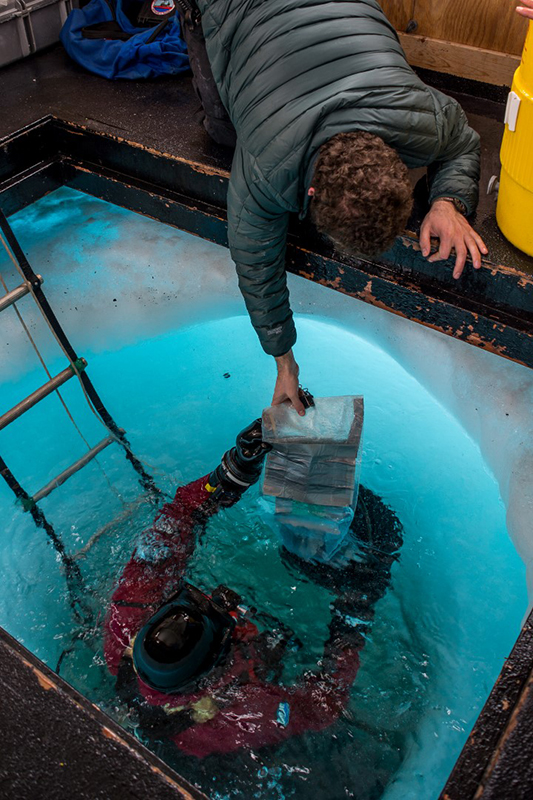
Photo Credit: Mike Lucibella
Diver Steve Rupp passes Ken Zillig a bag of collected fish from underneath the surface of the sea ice.
"The fish that have lived under stable conditions here in the Antarctic have done so for 11 to 14 million years," Todgham said. "The Antarctic is warming at a rate that's faster than most places on the planet, particularly on the [Antarctic] Peninsula, where they've already experienced one degree warming since the 1950s, which is a pretty high degree of warming for a fish that has spent millennia at something very stable." What's more, how well the fish of the Southern Ocean are coping could offer insights into fish all around the world. "Climate change is not limited to the Antarctic and we can’t study every species," Todgham said. "We look at species in different types of environments that are undergoing some similar changes and asking 'are there unifying themes in how animals can cope with multiple stressors?' because if there are, that gives us the power to project how fish we haven't studied might cope." The team is looking at the different physiological tradeoffs the fish make to compensate for changes in the environment, and the bioenergetics of which biological processes they preserve and which ones they scale back. "Animals have to be able to balance energy supply, which they get from food, with energy demand, which are the things that they need to do to survive," Todgham said. "If they can't balance those two, then the animal is going to outpace its abilities to supply different biological processes and then it has some costs to the animals." Every fish has a finite amount of energy it gets from eating. The team is studying how it uses that energy and what it prioritizes when stressed. When its environment changes because of climate change or any other reason, the animal needs to compensate either by changing its behavior or its physiology. These environmental changes can manifest themselves in different ways and have different effects on the fish. 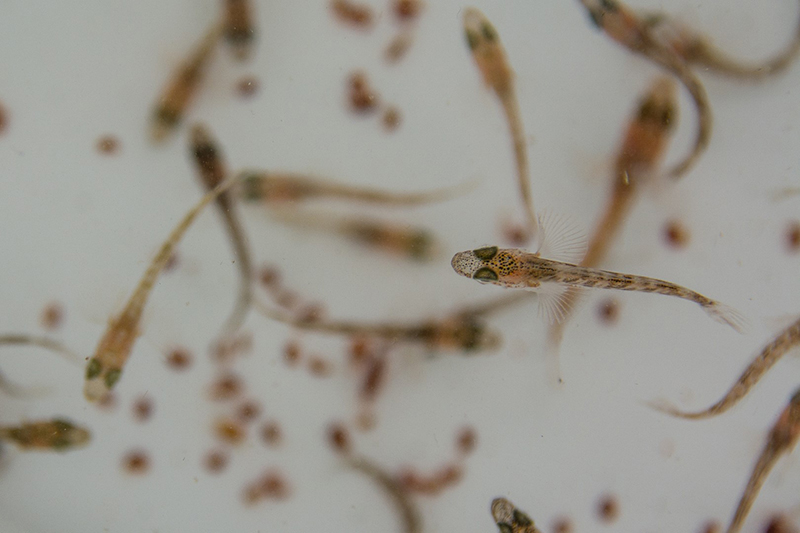
Photo Credit: Mike Lucibella
Juvenile Trematomus bernacchii swim around in a holding tank after being caught. They live in the crevices just below the sea ice.
"If there are costs to growth, that means that a fish that already grows slowly will grow more slowly, which might mean that when it becomes an adult and becomes reproductively active, it takes a lot longer," Todgham said. "Or if they can't swim around as much, maybe they are not able to forage for food as much or feed as quickly or as often or maybe they can't escape predators." The research team is raising juvenile fish under a number of different water conditions - warmer temperatures, higher carbon dioxide content and combinations of the two - to tease out the effects of each. The researchers are tracking how much each fish grows and how the stressors harm its ability to develop. They also are sending tissue samples back to their lab at U.C. Davis to look at metabolic enzymes as indicators of the fishes' ability to adjust its energy metabolism. If stressed fish are not producing the same enzymes or the same levels of them, it could be an indicator that their metabolism is affected. "In some of these tissues, we can look at expression of genes that might be turned on and off that are important in this compensation mechanism or the inability to compensate," Todgham said. Because they're cold-blooded, fish are particularly sensitive to changing water temperatures. Their body temperature stays the same as their environment, so as the waters around them warm, their body temperatures increase as well. "If you raise their body temperatures, everything just works faster. So that's going to make their metabolic costs just higher," Todgham said. "That kind of ramped up metabolism is sometimes too much because you're not ramping up feeding maybe at the same level as your metabolism is ramping up." 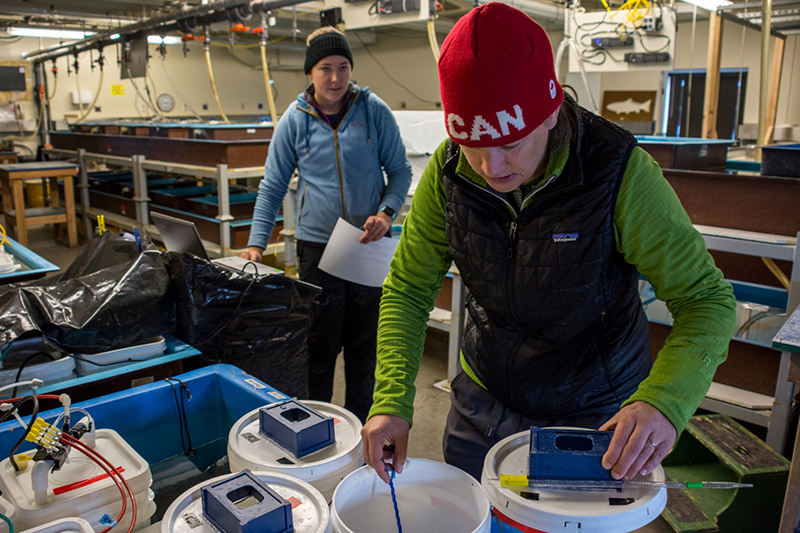
Photo Credit: Mike Lucibella
Anne Todgham (right) and Mandy Frazier tend to the fish in McMurdo Station's Crary laboratory.
Another way the researchers are gauging the fishes' metabolic response is by measuring their oxygen consumption. The more active its metabolism, the more oxygen it consumes. To measure this Mandy Frazier, a graduate student at U.C. Davis, set up a series of small experimental chambers with sensors to see how much oxygen the fish are pulling from the water. "I take a fish and put it in a tiny little jar with a recirculating system," Frazier said. "I let them hang out there for about three hours, until we know that they're really calm and they're just sitting there, doing their thing. And that's what we look at, the differences between the resting metabolic rates." Environmental stress can manifest as behavioral changes as well, and has been shown to make fish more nervous of their surroundings. Measuring this skittishness is important to understanding how their behavior changes, which may affect their long-term ability to respond to changes in their environment. "Capturing its boldness or anxiety may be a predictor of how it would behave in the wild in terms of encountering new things," Zillig said. "You can imagine a fish that may approach [a predator] when it shouldn't approach is probably going to get eaten, or it may not take advantage of a food resource that it is too afraid to touch. It's just sort of capturing whether future climate conditions are producing fish that are really avoiding predators or really not avoiding predators, that might have sort of large ecological ramifications." One of the tests aims to quantify how much more skittish the various species of fish are in changing ocean conditions. It's called the "novel-object test," and gauges how willing the fish is to investigate something it's never seen before. The team places the fish into an empty plastic bucket, which they refer to as an "arena," with a grid drawn on its base. They videotape it swimming for ten minutes, tracking how long it spends in each area of the arena. "Then after 10 minutes we add a novel object [that] we're pretty confident that the fish has never seen," Zillig said. 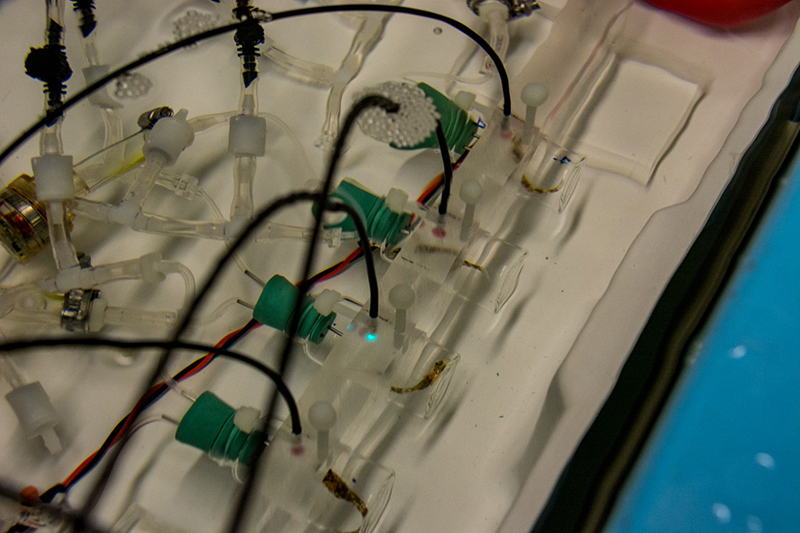
Photo Credit: Mike Lucibella
Sensors measure how much oxygen the fish juveniles pull out of the water under different conditions, telling researchers how their metabolism is functioning.
They then record the fish's movements for another ten minutes; tracking how long it spends close to this new object at the center versus around the edge of the arena. The more active it is, the more it's likely to investigate the introduced object, while if its feeling more skittish it's likely to hug the walls of the arena. "Then we can take that response and compare that response across different temperatures or different CO2 [levels] to see if those single stressors or combination of stressors alters how this fish is interpreting a foreign object," Zillig said. "Some conditions may yield fishes that are responding in an anxious matter, avoiding the object, others may yield fish that are more bold or are less anxious and will respond differently." This was the first season of the project. During coming field seasons, the team will continue to gather data about the stressors effects on the fish of the Southern Ocean. NSF-funded research in this story: Anne Todgham, University of California, Davis, Award No. 1744999. |



For USAP Participants |
For The Public |
For Researchers and EducatorsContact UsU.S. National Science FoundationOffice of Polar Programs Geosciences Directorate 2415 Eisenhower Avenue, Suite W7100 Alexandria, VA 22314 Sign up for the NSF Office of Polar Programs newsletter and events. Feedback Form |


